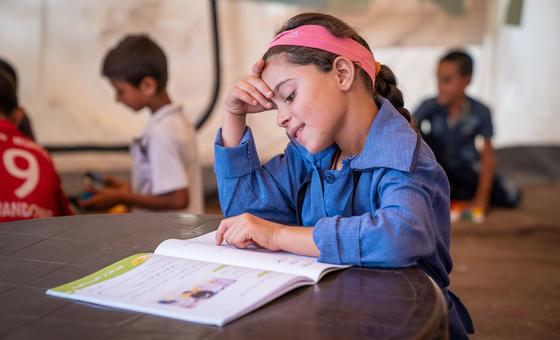Nearly 8,600 people on the move died in 2023, a 20 per cent increase from 2022, according to the UN agency’s Missing Migrants Project online platform.
It details the global movement of people risking their lives to escape conflict, economic crisis and natural disasters, including drought and flooding linked to climate change. IOM says the findings clearly show that there are far too few legal pathways for migrants.
Hundreds of thousands of people are continuing to embark on dangerous and illegal cross-border journeys every year
Death at sea
Data from IOM indicated that drowning accounted for slightly more than half of last year’s deaths, nine per cent involved vehicle accidents and seven per cent of fatalities were victims of violence.
The Mediterranean Sea crossing continues to be the deadliest route for migrants on record, with at least 3,129 deaths and disappearances in 2023. This is the highest death toll recorded since 2017.
Unprecedented numbers of migrant deaths were recorded across Africa (1,866) and Asia (2,138) last year.
“In Africa, most of these deaths occurred in the Sahara Desert and the sea route to the Canary Islands,” IOM said. “In Asia, hundreds of deaths of Afghan and Rohingya refugees fleeing their countries of origin were recorded last year.”
Support for Syrian refugee dwindles, as needs grow
The world is failing Syrian refugees and the communities that are hosting them as the brutal war inside their homeland enters its 14th year, the latest UN-led regional response plan warns.
At what is a volatile moment for the entire region, with conflict raging in Gaza, the needs of refugees are growing while funding to support them and their hosts is dwindling.
According to the 2024 regional strategic overview (3RP), the main regional platform to support Syrian refugees and their host communities, the urgent needs of more than 6.1 million Syrian refugees and 6.8 million host community members are increasingly going unmet.
In 2024, 3RP partners estimate that $4.9 billion is required to respond to the priority needs of vulnerable populations and institutions affected by the Syria crisis in Egypt, Iraq, Jordan, Lebanon and Türkiye.
Headwinds multiply
But, the mounting challenges of inflation, higher food and fuel prices, currency devaluation and high unemployment – especially among women and youth – are being aggravated by the ripple effects of Gaza’s humanitarian crisis and climate change.
The 3RP has gone from being over 60 per cent funded on average, between 2015 and 2018, to just 40 per cent from 2020 to 2022. Last year, only 30 per cent of the required funds were received.
This means people are being left out than are being supported, the plan warns.
“Thirteen years on, and with no political solution on the horizon, refugees from Syria continue to be in real need of international protection and asylum,” stressed Ayman Gharaibeh, UNHCR Regional Director for the Middle East and North Africa.
“With funding decreasing, millions of refugees and their hosts are plunging further into poverty and are exposed to multiple protection risks”, he added.
“The international community needs to stay the course by providing the required level of support and solutions to the most vulnerable. We must avert a situation where despair settles in.”
In Jordan, reduced funding jeopardizes services for the most vulnerable. Türkiye is grappling with increased vulnerabilities due to last year’s earthquakes and financial pressures.
Underfunding would leave 450,000 refugee children and youth without education. Health gaps, especially in immunization, pose threats to refugees, while 346,000 vulnerable households would lose food assistance.
Rights experts deplore UK appeal court decision on Shamima Begum
Independent UN rights experts have express deep concern following the ruling late last month of the United Kingdom’s Court of Appeal in the case of Shamima Begum, who travelled to Syria aged 15 to marry an ISIL fighter.
Ms. Begum “remains stripped of her citizenship, vulnerable and denied assistance and protection as a possible victim of trafficking”, the Human Rights Council-appointed UN experts said.
The experts called on the UK Government to take urgent action to provide Ms. Begum with assistance and protection, including repatriation, and to review and reconsider the decision to revoke her citizenship by the then Home Secretary.
The Court of Appeal rejected all the arguments presented by Ms. Begum’s lawyers on the ground that national security concerns voiced by the government took precedence over considerations of possible trafficking. She remains a prisoner in a camp in northern Syria, is now stateless and argues that she was brainwashed by the terrorist group.
Protection obligations
“Protections owed to victims of trafficking and those at risk of trafficking, especially children, must be respected to be meaningful,” the UN experts said.
They noted the Special Immigration Appeals Commission had identified potential State failures and possible violations of the State’s corollary duty to protect and prevent serious human rights violations prior to Ms. Begum’s departure from the UK as a vulnerable child, adding that “these circumstances were never properly investigated”.
“There is a credible suspicion that Ms Begum was recruited, transferred and then harboured for the purpose of sexual exploitation,” the experts said. “Human trafficking is an international crime, a form of modern slavery.”
They said that under international, European and UK law, any supposed question of “consent or voluntariness or use of force, deception or coercion is irrelevant where the victim of trafficking is a child”.
The experts, who do not receive a salary for their work and operate in a strictly independent capacity, said the court judgement renders Ms. Begum effectively stateless, which violates international law.
“Given the continuing serious risk of irreparable harm, we urge British authorities to take steps to ensure Ms Begum’s protection and to follow the lead of many other governments who are now repatriating women and children from northeast Syria,” the experts said.

